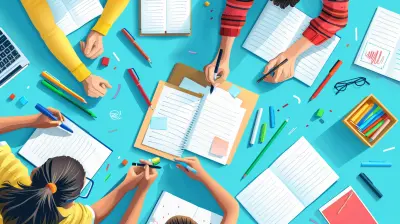How to Challenge Gifted Students Without Overwhelming Them
6 June 2025
Gifted students are like racehorses, bursting with potential, speed, and energy. But here's the catch: without the right guidance, they can either run wild or burn out much quicker than you’d expect. As educators or parents, we often find ourselves in a tricky spot—how do you push these bright minds to their limits without crossing the line into overwhelm? It’s a balancing act, and honestly, it’s one of the most challenging tasks in education.
But don’t worry, this article will walk you through how to challenge gifted students effectively while keeping them engaged, motivated, and—most importantly—happy. Ready? Let’s dive in.

Understanding What Makes Gifted Students Unique
Before we jump into strategies, it’s essential to understand what sets gifted students apart. It’s not just about being “smart” or achieving high grades. Giftedness often comes with a unique set of characteristics:- Rapid learning ability: They can grasp complex concepts quickly, often faster than their peers.
- Intense curiosity: They ask a lot of questions and are deeply curious about the world around them.
- Heightened sensitivity: Emotionally, they may feel things more deeply, and intellectually, they may get frustrated with routine or boring tasks.
- Asynchronous development: While they might excel in one area, they may lag in others, like social skills or emotional maturity.
Understanding these traits helps us better cater to their needs. Just because they’re “gifted” doesn’t mean they don’t struggle or need different approaches to learning.

Why Over-Challenging Can Be Detrimental
It’s tempting to think, “If they’re gifted, they can handle more, right?” Not necessarily. Gifted students can easily become overwhelmed if the challenges are too intense or they’re thrown too many at once. This can lead to:- Burnout: They may become exhausted, lose interest in learning, or even stop trying altogether.
- Perfectionism: Gifted students often set extremely high expectations for themselves. Constantly pushing them to their limits can exacerbate this tendency.
- Anxiety and stress: While they may appear confident, these students can feel immense pressure to succeed, leading to unnecessary stress and anxiety.
The goal is to find that sweet spot where students feel challenged but not crushed by the weight of expectations.

How to Challenge Gifted Students Without Overwhelming Them
1. Differentiate the Curriculum
Differentiation is a buzzword in education, but for a good reason. Gifted students often need more than the standard curriculum offers. By differentiating, you can adjust the content, process, or product to meet their needs.How to do it:
- Content: Provide advanced or more in-depth materials on topics they’re interested in. If the class is learning about the solar system, challenge them with articles on black holes or discussions on quantum physics.
- Process: Allow them to choose how they want to learn. Maybe they prefer independent study or working in small groups with peers who share similar interests.
- Product: Let them demonstrate what they’ve learned in creative ways—whether it’s building a model, writing a play, or coding a program.
2. Use Open-Ended Questions and Projects
Gifted students thrive on complexity and ambiguity. Open-ended questions and projects allow them to explore multiple possibilities, rather than just searching for a single correct answer.Example: Instead of asking, “What’s the capital of Spain?”, ask, “How might the culture of Madrid differ if Spain’s history took a different path?”
Why it works: This type of questioning encourages higher-order thinking, creativity, and problem-solving—all qualities that gifted students crave in order to stay engaged.
3. Introduce Independent Study
Gifted students often have a strong desire for autonomy. Independent study gives them the freedom to dive deeper into a subject they’re passionate about.How to implement it:
- Allow them to choose a topic of interest (within reason, of course) and give them the necessary resources to explore it. They can set their own goals and work at their own pace.
- Schedule regular check-ins to ensure they’re on track, but let them lead the process.
Bonus Tip: Encourage them to present what they’ve learned to the class. This not only builds confidence but also enhances communication skills.
4. Encourage Peer Collaboration
It’s easy to assume that gifted students prefer working alone, but collaboration can be incredibly beneficial. Pairing gifted students with peers of similar ability—or even in mixed-ability groups—can challenge them in new ways.Why it works:
- They can learn from others’ perspectives.
- It fosters leadership skills, especially when they’re guiding a group.
- In mixed-ability groups, they can develop patience and empathy by helping others.
5. Focus on Depth, Not Just Speed
It’s a common misconception that gifted students need to move through material faster. While they may grasp concepts quickly, they often benefit more from diving deeper into a subject rather than simply racing ahead.What you can do:
- Encourage them to explore related topics or ask them to apply their knowledge to real-world problems.
- Assign longer-term projects that require research, experimentation, or critical thinking beyond the textbook.
Example: If they’ve mastered algebra, instead of pushing them straight into calculus, challenge them to investigate how algebra is applied in fields like engineering or economics.
6. Incorporate Critical Thinking and Problem Solving
Gifted students love a good challenge, especially when it involves critical thinking and problem-solving. Incorporating these skills into their daily learning keeps them engaged and mentally stimulated.How to do it:
- Present scenarios that require analysis, such as case studies or real-world problems.
- Introduce puzzles, logic games, or debates that require them to think on their feet and defend their ideas.
Example: Instead of giving them a math worksheet full of equations, present them with a real-world financial problem. How would they create a savings plan for a fictional company that’s about to face bankruptcy?
7. Provide Opportunities for Leadership
Gifted students often have strong ideas and a natural inclination to lead. Giving them leadership opportunities can boost their confidence and give them an outlet to channel their energy.Suggestions:
- Let them mentor younger students.
- Assign them a leadership role in group projects.
- Encourage them to organize school events, clubs, or academic competitions.
Why it works: Leadership roles help them develop social skills, emotional intelligence, and the ability to work within a team—skills that are sometimes underdeveloped in gifted students.
8. Address Emotional Needs
Gifted students aren’t just intellectual powerhouses; they can also be emotionally sensitive. They might feel isolated, misunderstood, or overwhelmed by the weight of expectations.How to support their emotional needs:
- Be available for one-on-one conversations when they’re feeling stressed or anxious.
- Encourage them to express their feelings, whether through journaling, art, or talking.
- Help them understand that it’s okay not to be perfect and that failure is part of the learning process.
Why it matters: Emotional well-being is just as important as intellectual growth. A gifted student who feels supported emotionally is far more likely to thrive academically.
9. Celebrate Effort, Not Just Achievement
Gifted students are often praised for their intelligence or achievements, but this can create a fixed mindset. Instead, focus on celebrating their effort, growth, and perseverance.How to do it:
- Praise hard work, creativity, and curiosity, not just the final product.
- Encourage them to take risks and learn from mistakes.
Example: If a student fails to solve a complex problem, celebrate the fact they tried multiple strategies before arriving at a solution, even if it wasn’t the correct one.
10. Keep Communication Open with Parents
Parents of gifted students often worry about their child’s education, and rightly so. It’s vital to keep open lines of communication with them to ensure the student is receiving the right balance of challenge and support.How to foster communication:
- Schedule regular meetings or check-ins with parents.
- Share updates on their child’s progress, strengths, and areas for improvement.
- Encourage parents to provide feedback on how their child is feeling at home.
Why it’s important: A strong partnership between teachers and parents creates a support system that allows gifted students to thrive both academically and emotionally.

Conclusion
Challenging gifted students without overwhelming them is a fine line to walk, but it’s absolutely possible with the right strategies. By differentiating instruction, encouraging independent study, incorporating critical thinking, and addressing emotional needs, you can help these students reach their full potential while ensuring they remain engaged and happy.Remember, it’s not about pushing harder or faster—it’s about fostering a love for learning that will carry them through life. After all, education isn’t a sprint; it’s a marathon. And gifted students, like everyone else, need the right pacing to go the distance.
all images in this post were generated using AI tools
Category:
Gifted EducationAuthor:

Zoe McKay
Discussion
rate this article
3 comments
April Meyers
Unlock their potential, but tread lightly on fragile minds.
June 22, 2025 at 2:50 AM

Zoe McKay
Thank you for your insight! Balancing challenge with support is crucial for nurturing gifted students while safeguarding their mental well-being.
Amber Rocha
Great tips! Balancing challenge and support is key. Let's keep those bright minds buzzing without sending them into orbit! It's all about sparking joy in learning, not stress. 🚀✨
June 16, 2025 at 12:55 PM

Zoe McKay
Thank you! Absolutely, fostering joy in learning while providing the right level of challenge is essential for nurturing gifted minds. 🌟
Tempest Dodson
Thank you for this insightful article! It’s crucial to find that balance in challenging gifted students while ensuring they don’t feel overwhelmed. Your practical tips are a valuable reminder of the importance of nurturing their potential thoughtfully and compassionately.
June 8, 2025 at 10:42 AM

Zoe McKay
Thank you for your kind words! I'm glad you found the tips helpful in nurturing gifted students thoughtfully.



